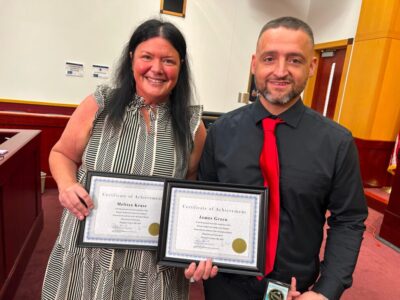What Nobel Prizes say about greatness
It’s Nobel Prize season. The just-announced 2021 winners in medicine/physiology are two Americans, Dr. David Julius and Dr. Ardem Patapoutian, who’ve done groundbreaking research on the senses of touch, taste, heat and pain. Their joint discoveries may yield new, nonopioid treatments for pain and other breakthroughs. Patapoutian had his cellphone switched off, and so he missed the call from Stockholm. The committee eventually reached his 94-year-old father on a landline, so Patapoutian learned that he hit the prestige jackpot from his dad.
Do you feel a flush of pride when Americans win Nobel Prizes? I do. It’s a sign that for all of our division, disarray and decay, we continue to achieve excellence. If you peruse the winners of Nobel Prizes by country since 1901, you find that a number of European countries are well-represented. France has earned 70, Germany 111, and Great Britain 135. Russia/Soviet Union claimed 31, and Belgium 11. But towering over the list is the USA with 392.
This year’s winners in medicine are not atypical. One is native-born, and the other an immigrant. Patapoutian, who traces his ancestors to Armenia, was born in Beirut. He and his brother fled the civil war there when he was 18. While at UCLA, he fell in love with basic research.
Our universities are plagued by groupthink and wokeness. But those smothering fashions mostly skip the hard sciences, where a combination of investment in basic research, rigorous standards and a long tradition of academic freedom create the conditions for discoveries to bloom. By the way, China has earned eight Nobel Prizes.
Our openness to immigrants is part of the story, too. Since the prizes began at the start of the 20th century, immigrants have accounted for 37 percent of American winners in the hard sciences.
That talented people of all sorts (including those with little education) yearn to come here remains one of our greatest strengths. As Patapoutian reflected, “In Lebanon, I didn’t even know about scientists as a career.”
But there are movements in America now to limit or even eliminate programs for the gifted and talented. In New York, a task force appointed by Mayor Bill de Blasio recommended abolishing all of the city’s gifted programs and selective high schools. Seattle’s system of testing children in early grades to identify “highly capable” learners has come under fire. And in northern Virginia, the Thomas Jefferson High School for Science and Technology, or TJ, has changed its admission criteria to be more inclusive.
There is always a tension in democracies between excellence and egalitarianism. The gap between subgroups in school performance gives rise to calls to change standards so that the representation of each group in elite institutions can more accurately reflect the group’s percentage of the population.
TJ, a magnet school renowned for its superior math and science curriculum, is close to where my children grew up. They were eligible to apply but weren’t STEM-oriented, so they took a pass. But other families, especially immigrants from Asia, regarded admission to TJ as the holy grail — a public high school that could be a ticket to the best colleges — and their kids studied hard to secure one of those valuable slots.
TJ’s admission test led to student enrollments that were not reflective of the ethnic groupings in the region. Fairfax County’s overall student body is 38 percent white, 27 percent Hispanic, 20 percent Asian and 10 percent Black. In the 2019-2020 school year, enrollment at TJ was 71.5 percent Asian, 19.48 percent non-Hispanic white, 2.6 percent Hispanic or Latino, 1.72 percent Black and 4.7 percent other.
The new admission criteria adopted for the 2021-2022 school year eliminated the standardized test, raised the required grade-point average, and allocated slots in the freshman class for the top 1.5 percent of students from each middle school. It also eliminated the $100 application fee.
The STEM-centric education at TJ isn’t for every student, but it does serve society at large. The kind of students who are capable of advanced math and science work go on to make discoveries that help the rest of us live better lives. It should be there for the future Dr. Patapoutians.
——
Mona Charen is policy editor of The Bulwark
and host of the “Beg to Differ” podcast.




